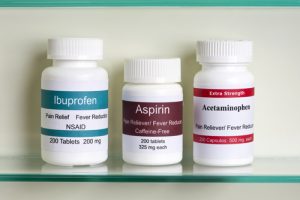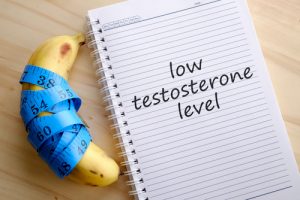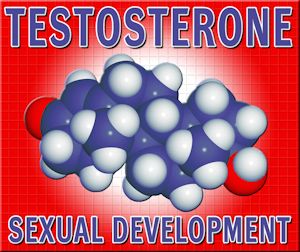 In recent years, there have been increasing concerns regarding the effect of Ibuprofen on Testosterone Levels.
In recent years, there have been increasing concerns regarding the effect of Ibuprofen on Testosterone Levels.
There have recently been some scaremongering articles that suggest that Ibuprofin use can have a disastrous impact on Testosterone Levels.
It's important to recognize that news magazines have pressure to sensationalize stories to draw readers. On the other hand, there is often a grain of fact behind the shocking headlines. Let's delve deeper and work toward the truth.
Video Link: https://vimeo.com/291647154
Video Download: Click Here To Download Video
Video Stream: Click Here To Stream Video
In a recent study, researchers gathered evidence from both laboratory analysis and human trials to investigate the effects of Ibuprofen on Testosterone Levels.
While it's true that Significant Low-T dramatically impairs Fertility and can even lead to total infertility without HRT Intervention, this particular research did not specifically investigate the effects of Ibuprofen on Fertility.
30 Men Take Ibuprofen for 42 Days
In the investigated clinical study, thirty male participants took 1200 milligrams  of ibuprofen per day for 1½ months to determine the effects of Ibuprofen Overdose on Testosterone Levels.
of ibuprofen per day for 1½ months to determine the effects of Ibuprofen Overdose on Testosterone Levels.
The average single dose of Ibuprofen is 400 milligrams. While it is possible that an individual would take three Ibuprofen pills per day for an extended period, this is indeed an edge case that doesn't apply to the vast majority of people that utilize Ibuprofen for pain relief.
Despite that, this study does provide critical information regarding the effect of Ibuprofen on Testosterone Production and Fertility.
Researchers discovered that long-term ibuprofen dosing had no significant impact on Testosterone Levels, but did lead to an increase in Luteinizing Hormone, which is a crucial Testosterone secretagogue.
Along with the clinical aspect of this study, researchers also examined the effects of Ibuprofen directly on the Leydig Cells associated with Testosterone Production.
They discovered that the direct application of Ibuprofin upon such cells did harm Testosterone Production. On the other hand, this is more of a proof-of-concept than a rational way to determine the effects of oral, therapeutic administration of Ibuprofen as a medical treatment.
What Does This Mean for Men that Take Ibuprofen?
When the body produces elevated Luteinizing Hormone while maintaining normalized Testosterone Production, this is a situation referred to as Compensated Hypogonadism.
This is generally a characteristic of the aging process. It means that the body is having to work harder to maintain healthy Testosterone Levels. Typically, this also means that the male reproductive system is having issues that could contribute to low libido and erectile dysfunction.
While further, more specific, research does need to be conducted; this doesn't mean that you should abandon Ibuprofin altogether.
You shouldn't even worry much even if you take Ibuprofen frequently to deal with aches, pains, and other symptoms. On the other hand, if you do treat with Ibuprofen every day, you should talk to a doctor about what steps you can take to improve your current pain management routine.
How Did This Story Get Legs?
 By analyzing the way that this study was interpreted by the media, we can learn a lot about how medical news stories get twisted and misinterpreted.
By analyzing the way that this study was interpreted by the media, we can learn a lot about how medical news stories get twisted and misinterpreted.
This study was a joint effort between research institutions in China, France, and Denmark. The study was funded by a wide range of sponsors, including the University of Rennes, the Lundbeck Foundation, and the Nordea Foundation Healthy Ageing Grant.
The goal of this research is to contribute to the art and science of aging gracefully.
Despite being a study that was somewhat limited in the effects that it monitored, many media stories exaggerated the range of the study, to the point that they alleged that Ibuprofen could have severe repercussions upon fertility and testicular fullness.
What Was the Goal of this Ibuprofen-Testosterone Study?
In the end, this was a small yet statistically significant study designed only to assess the effects of Ibuprofen on Testosterone Levels and the Levels of Testosterone Precursors such as Luteinizing Hormone.
While it's true that chronic Low Testosterone has a hugely negative impact on fertility, that was not within the scope of the study, and it's not something that can be reasonably deduced, especially for the average person that takes Ibuprofin.
What we do know is that Infertility and Testosterone Deficiency are becoming more common, especially in places like the United States and Europe. It appears that there are specific factors directly associated with the Western lifestyle, which directly contribute to diminished Testosterone Levels.
Over the last two generations, male sperm count has dropped by over half. That's profoundly concerning to health advocates across the world and may have substantial implications for developing countries looking to Westernize.
The leading hypothesis right now is that Hormone Balance is being disrupted by environmental factors, and millions of dollars are being spent to identify sources of endocrine disruption among males.
Some researchers believe that certain low-strength pain relievers such as Tylenol and Ibuprofen may be having a suppressive effect on Testosterone Production.
Testosterone is the source of masculinity, not only contributing to sexual function, but also body fat distribution, strength, energy, and psychological wellness. Testosterone Deficiency has widespread negative implications for male health, including increased risk of depression, diabetes, osteoporosis, hypertension, heart attack, and more.
What Did This Study Determine about Ibuprofen and Testosterone: What Were Its Limitations?
While this study produced reliable results regarding the impact of Ibuprofen on  Testosterone Levels, there's not enough evidence to come to broad conclusions.
Testosterone Levels, there's not enough evidence to come to broad conclusions.
While the long-term heavy use of Ibuprofen may hurt fertility, it appears that these adverse effects are temporary and associated with chronic use.
In the end, this study determined that high-frequency Ibuprofen use makes the body have to work harder to maintain normalized Testosterone Levels, as evidenced by the increase in Luteinizing Hormone concentrations in the bloodstream.
In the end, researchers could determine that the Compensated Hypogonadism experienced by these participants is comparable to that associated with the aging process and that this form of hormone imbalance is related to physiological and sexual issues in that age group.
Further research will need to be conducted to examine additional physiological effects related to such use.
At this point, there is no direct evidence that Ibuprofin has an immediate impact on Fertility and Symptomatic Low-T. The goal of this study was merely to monitor hormonal changes and not to evaluate the physiological effects of those changes.
On the other hand, with the myriad of chemicals and other physiological influences that our bodies experience every day, it's essential to recognize which of those issues may affect Hormone Imbalance.
While the effects of Ibuprofen may ultimately minor on their own, they may be more problematic when combined with other Endocrine-Disrupting chemicals.
Unless you take Ibuprofen as a chronic means of pain relief, occasional use of the medication should be negligible enough that the benefits of the treatment far outweigh their disadvantages.
References
Ibuprofen linked to testosterone problems
Ibuprofen appears to mess with male hormones. Should you be worried?
Contact Us Today For A Free Consultation

- Testosterone for Women [Last Updated On: December 1st, 2023] [Originally Added On: December 29th, 2013]
- Testosterone Androgen [Last Updated On: December 11th, 2023] [Originally Added On: December 29th, 2013]
- Testosterone and Body Building [Last Updated On: December 14th, 2023] [Originally Added On: December 30th, 2013]
- Testosterone Levels [Last Updated On: December 6th, 2023] [Originally Added On: December 31st, 2013]
- Testosterone Gel, Cream, and the Testosterone Patch [Last Updated On: November 28th, 2023] [Originally Added On: December 31st, 2013]
- Buy Testosterone | Types of Testosterone Replacement Therapy Programs, Injections, Cream and Gel [Last Updated On: December 13th, 2023] [Originally Added On: December 31st, 2013]
- Buy Testosterone Injections Online, Testosterone Prescription for Low T, Testosterone Replacement Therapy [Last Updated On: October 16th, 2020] [Originally Added On: January 1st, 2014]
- Aging and Testosterone Replacement Therapy [Last Updated On: December 12th, 2023] [Originally Added On: January 3rd, 2014]
- What Causes Low Testosterone [Last Updated On: December 10th, 2023] [Originally Added On: January 7th, 2014]
- Hormone Levels in Men [Last Updated On: December 4th, 2023] [Originally Added On: January 12th, 2014]
- Hormone Level Testing [Last Updated On: November 29th, 2023] [Originally Added On: January 13th, 2014]
- Types of Testosterone Products and Delivery [Last Updated On: December 8th, 2023] [Originally Added On: January 22nd, 2014]
- Testosterone Therapy Helps Men with Low-T Ward Off Prostate Cancer [Last Updated On: May 29th, 2024] [Originally Added On: December 29th, 2019]
- The Importance of Dietary Fat for Testosterone Production [Last Updated On: July 8th, 2024] [Originally Added On: January 2nd, 2020]
- Testosterone Deficiency and Low-T at Epidemic Levels Among Men in the United States [Last Updated On: May 27th, 2024] [Originally Added On: May 17th, 2020]
- The Effects of Testosterone Therapy on Male Patients -- Who Should Use Testosterone? [Last Updated On: December 20th, 2023] [Originally Added On: June 16th, 2020]
- The Link Between Testosterone and Lower Rates of Autoimmune Diseases Among Men [Last Updated On: January 30th, 2024] [Originally Added On: June 21st, 2020]
- Weight Cycling and the Problem with Crash Dieting [Last Updated On: April 8th, 2024] [Originally Added On: July 30th, 2020]
- Reexamining Bio-Identical Testosterone Therapy [Last Updated On: June 18th, 2024] [Originally Added On: August 12th, 2020]
- Understanding how Muscle and Fat Impact Body Mass, Weight, and Health [Last Updated On: April 15th, 2024] [Originally Added On: August 25th, 2020]
- The Role of Nitric Oxide in Cancer Proliferation And Prevention [Last Updated On: May 3rd, 2024] [Originally Added On: August 26th, 2020]
- Understanding Heartburn in the 21st Century [Last Updated On: April 24th, 2024] [Originally Added On: August 28th, 2020]
- What is Erectile Dysfunction? [Last Updated On: April 20th, 2024] [Originally Added On: August 30th, 2020]
- Sermorelin Acetate Drug Information [Last Updated On: April 7th, 2024] [Originally Added On: August 31st, 2020]
- Exercise and Mental Health [Last Updated On: April 5th, 2024] [Originally Added On: September 1st, 2020]
- The Importance of Proteins, Carbs, and Fats [Last Updated On: March 11th, 2024] [Originally Added On: September 2nd, 2020]
- Low-T Treatment Before and After -- How Testosterone Therapy Improves Vitality [Last Updated On: April 9th, 2024] [Originally Added On: September 6th, 2020]
- Changes to LabCorp Guidelines for Low-T Diagnosis and How They Impact Your Treatment [Last Updated On: July 14th, 2024] [Originally Added On: September 22nd, 2020]
- The Effects of Testosterone on Asthma Prevalence Among Men and Women [Last Updated On: February 19th, 2024] [Originally Added On: October 6th, 2020]
- 7 Exercises to Elevate Testosterone Levels [Last Updated On: June 13th, 2024] [Originally Added On: October 10th, 2020]
- Vitamin A is Essential for Good Health - Are You Getting Enough ? [Last Updated On: April 16th, 2024] [Originally Added On: October 14th, 2020]
- Testosterone and Diet – How to Support Testosterone Levels with Healthy Eating [Last Updated On: June 7th, 2024] [Originally Added On: October 29th, 2020]
- The Significance of Telomeres in Stem Cell Treatments [Last Updated On: March 16th, 2024] [Originally Added On: November 27th, 2020]
- The Influence of Testosterone on Protective Mating Behaviors in Men [Last Updated On: January 25th, 2024] [Originally Added On: December 6th, 2020]
- The Role of Testosterone in Women's Health [Last Updated On: December 24th, 2023] [Originally Added On: December 7th, 2020]
- Testosterone Promotes Bone Health and Can Help Treat Osteoporosis [Last Updated On: February 15th, 2024] [Originally Added On: December 17th, 2020]
- The Relationship Between Testosterone and Cortisol [Last Updated On: April 2nd, 2024] [Originally Added On: December 19th, 2020]
- The Importance of Sex Hormone-Binding Globulin (SHBG) for Healthy Testosterone Levels [Last Updated On: March 9th, 2024] [Originally Added On: December 28th, 2020]
- 12 Health Issues That Can Kill Libido and Limit Sexual Performance [Last Updated On: May 23rd, 2024] [Originally Added On: January 3rd, 2021]
- 4 Foods to Boost Your Testosterone Levels [Last Updated On: February 7th, 2024] [Originally Added On: January 4th, 2021]
- Low Testosterone Symptoms [Last Updated On: December 31st, 2023] [Originally Added On: January 7th, 2021]
- Is Male Menopause Real? The Science of Andropause [Last Updated On: January 15th, 2024] [Originally Added On: January 11th, 2021]
- Relieve Fatigue and Increase Energy with Testosterone Replacement Therapy [Last Updated On: January 16th, 2024] [Originally Added On: January 16th, 2021]
- How to Administer a Testosterone Injection -- Low-T Injection Guide [Last Updated On: February 28th, 2024] [Originally Added On: January 17th, 2021]
- Testosterone Levels Associated with Serotonin Activity in the Brain [Last Updated On: March 26th, 2024] [Originally Added On: January 19th, 2021]
- Grumpy Old Man Syndrome – Causes and Treatments [Last Updated On: June 8th, 2024] [Originally Added On: January 22nd, 2021]
- The Effects of Beer on Testosterone Production and Gynecomastia [Last Updated On: March 21st, 2024] [Originally Added On: January 30th, 2021]
- Testosterone Frequently Asked Questions [Last Updated On: February 6th, 2024] [Originally Added On: February 26th, 2021]
- Testosterone Supplements: Vitamin and Amino Acid Pills Versus Real Testosterone [Last Updated On: November 21st, 2024] [Originally Added On: March 1st, 2021]
- Testosterone Side Effects, Risks, Dangers and Negative Effects [Last Updated On: November 7th, 2024] [Originally Added On: March 2nd, 2021]
- Testosterone for Men [Last Updated On: February 20th, 2024] [Originally Added On: April 13th, 2021]
- Testosterone Testing [Last Updated On: November 9th, 2024] [Originally Added On: May 7th, 2021]
- Hormone Replacement Therapy: Commonly Asked Questions [Last Updated On: February 20th, 2024] [Originally Added On: June 16th, 2023]
Word Count: 1148





















